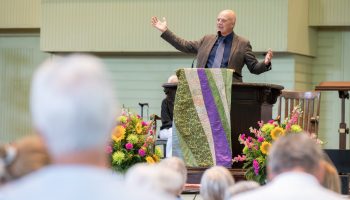
Religion is often used to justify acts of violence. When beliefs are used to invoke feelings of hate, people must look at their traditions and see what religion is calling them to do, and if it is right. Anantanand Rambachan, professor emeritus of religion at St. Olaf College, will speak to this when he delivers his lecture at 2 p.m. today in the Hall of Philosophy for the Week Six Interfaith Lecture Series theme “Religion’s Role in Conflict and Extremism.”
“I would like to describe two familiar positions,” Rambachan said. “The one position is that religion has nothing to do with conflict and violence, and opponents of this position often say that religion is only about peace and harmony and has nothing, as I said, to do with conflict.”
The first position is a “very idealistic” understanding of religion, which aims to “exempt religion from all responsibility” for conflict and violence, he said.
“The second position — and this is advocated primarily by those who reject religion, and they have (an) argument that religion intrinsically disposes human beings to violence — that religion contributes to the formation of identities,” Rambachan said. “These identities are oppositional. They are often hierarchical, and so religion creates the context that leads to conflict and violence.”
Rambachan said his argument will be to give the “truth” about the relationship between religion and conflict found between these two positions.
“It is difficult to argue, historically, that religions are always innocent and exempt from responsibility in situations of violent conflict,” he said. “At the same time, I believe religion is not intrinsically violent.”
Religion has moral and ethical resources to contribute to the “coming of conflict and extremism,” Rambachan said.
“We can’t overlook the historical role of religions contributing to conflict,” he said. “But at the same time, we cannot burn religion as solely oriented to violence and conflict.”
People who are committed to religion are not willing to “problematize” such commitment, Rambachan said. Meaning, these people hold a “very idealistic or utopian” view of religion and are reluctant to be self-critical about their traditions or even, he said, acknowledge the ways in which interpretations of religion or religious practice can contribute to violence and conflict.
“It is so important that those who have religious commitment profess those commitments with a deep self-critical approach, and not in a very naive one,” Rambachan said. “They tend to attribute responsibility for conflict and violence to forces outside of religion.”
The second position, which Rambachan said he presents as those who argue religion leads to violence, is a position advocated “primarily” by people who reject religion.
“The problem with that view, also, is that overgeneralization is a sweeping dismissal of religion’s role and religion’s resources for peacemaking and for overcoming conflict,” he said.
Living in a world where “the majority of people” still profess a commitment to one of the religious traditions of humanity, Rambachan said religion continues to be important. At the same time, he said in “so many places of conflict,” there is a religious dimension.
“Given the importance of religion and the fact that religions continue to be present in places of deep conflict in our world, … it is very important that we address this subject and we look and discuss and consider the role of religion in situations of conflict and violence,” Rambachan said.
There are people who invoke religion and religious teachings to legitimize acts of violence, he said.
“We have to question that because when those kinds of acts are undertaken in the name of religion, I think what we are seeing is a particular understanding of the divine, in particular theology, a theology that must be critically interrogated,” Rambachan said.
Part of the “reality” of religion is the way in which followers of religion “summon religion” to justify division and hate or to marginalize and denigrate others, he said.
“I’m hoping that those who come and listen to my lecture will become aware of the resources for peacemaking and overcoming conflict that I will share,” he said. “… At the same time, also, I hope they will go back with a more self-critical perspective on their own traditions and think about the ways in which their own traditions — historically and parts even now in contemporary times … — contribute to conflict.”




